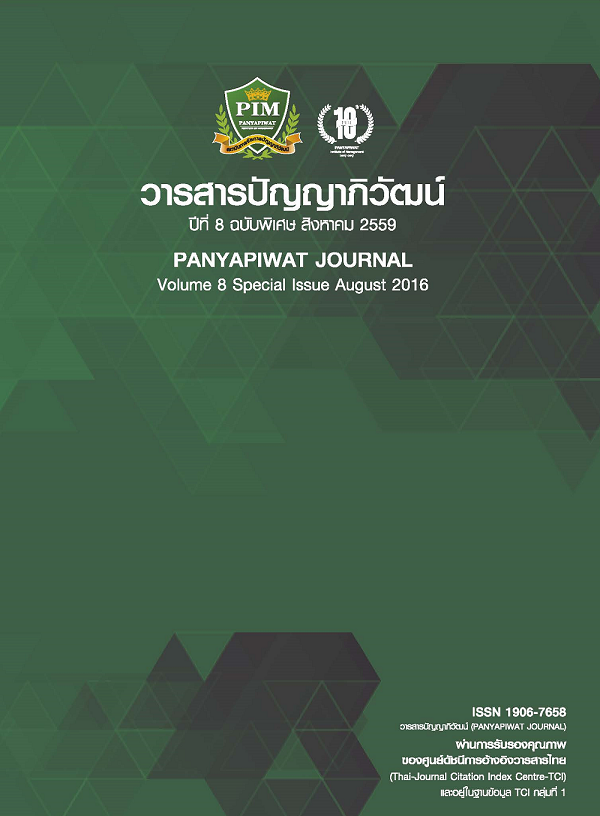WHAT IS MANAGEMENT RESEARCH FOR? WHAT CAN IT DO? WHAT SHOULD IT DO?
Main Article Content
บทคัดย่อ
Management research as a particular variety of social scientific research always faces continuous and fierce challenge and criticism. What is management research for? What can it do? What should it do? These three ontological and epistemological questions have always been considered as the core and fundamental argument in the field of management study. Through systematically discussing and analysing the various ontological and epistemological positions which formed the base of contemporary management research, this paper is to reflect that no matter what ontological and epistemological perspectives the research stands for, they are just the version of controversies and only represent the point of view of one school or several groups of academics but not final, determinative and absolute truth. Any truth is continually developed and revised. Management research as the centre of social research should hold an open and flexible tenet to accept and encourage the development of various ideas rather than merely blindly worship a dominant doctrine.
Article Details
“ข้าพเจ้าและผู้เขียนร่วม (ถ้ามี) ขอรับรองว่า บทความที่เสนอมานี้ยังไม่เคยได้รับการตีพิมพ์และไม่ได้อยู่ระหว่างกระบวนการพิจารณาลงตีพิมพ์ในวารสารหรือแหล่งเผยแพร่อื่นใด ข้าพเจ้าและผู้เขียนร่วมยอมรับหลักเกณฑ์การพิจารณาต้นฉบับ ทั้งยินยอมให้กองบรรณาธิการมีสิทธิ์พิจารณาและตรวจแก้ต้นฉบับได้ตามที่เห็นสมควร พร้อมนี้ขอมอบลิขสิทธิ์บทความที่ได้รับการตีพิมพ์ให้แก่สถาบันการจัดการปัญญาภิวัฒน์หากมีการฟ้องร้องเรื่องการละเมิดลิขสิทธิ์เกี่ยวกับภาพ กราฟ ข้อความส่วนใดส่วนหนึ่งและ/หรือข้อคิดเห็นที่ปรากฏในบทความข้าพเจ้าและผู้เขียนร่วมยินยอมรับผิดชอบแต่เพียงฝ่ายเดียว”
เอกสารอ้างอิง
Alvesson, M. & Deetz, S. (2000). Doing Critical Management Research. London: Sage.
Bateson, G. (1972). Steps to An Ecology of Mind. New York: Ballantine.
Bryman, A. & Bell, E. (2007). Business Research Methods. New York: Oxford University Press.
Buckley, W. (1967). Sociology and Modern System Theory. Englewood Cliffs, N.J.: Prentice-Hall.
Burrell, G. & Morgan, G. (1979). Sociological Paradigms and Organisational Analysis. Hants: Ashgate.
Comte, A. (1853). The Positivist Philosophy, Vol. 1(freely trans. by H. Martineau). London: Chapman.
Easterby-Smith, M., Thorpe, R. & Jackson, P. R. (2008). Management Research. London: Sage.
Grey, C. & Willmott, H. (2002). “Contexts of CMS”. Organization, 9(3), 411-418.
Guba, E. G. & Lincoln, Y. S. (1989). Fourth Generation Evaluation. Newbury Park, CA: Sage.
Guba, E. G. & Lincoln, Y. S. (2005). “Paradigmatic Controversies, Contradictions, and Emerging Confluences”, in Denzin, N. K. & Lincoln, Y. S. (eds.). The Sage Handbook of Qualitative Research. Thousand Oaks, California: Sage.
Gummesson, E. (2000). Qualitative Methods in Management Research. Thousand Oaks, California: Sage.
Hislop, D. (2005). Knowledge Management in Organisations: A Critical Introduction. New York: Oxford University Press.Lynch, M. (2000). “Against Reflexivity as An Academic Virtue and Source of Privileged Knowledge”. Theory, Culture and Society, 17(3), 26-54.
Martin, J. (1990). “Deconstructing Organisational Taboos: The Suppression of Gender Conflict in Organisations”. Organization Science, 1(4), 339-359.
Morgan, G. & Smircich, L. (1980). “The Case for Qualitative Research”. Academy of Management Review, 5(4), 491-500.
Prasad, P. (2005). Crafting Qualitative Research: Working in the Post-positivist Traditions. New York: M.E. Sharpe.
Richardson, L. (1998). Writing: A Method of Inquiry, in Denzin, N. K. & Lincoln, Y. S. (eds.). Collecting and Interpreting Qualitative Materials. Thousand Oaks: Sage.
Saunders, M., Lewis, P. & Thornhill, A. (2007). Research Methods for Business Students. Essex: Pearson Education.
Smith, J. K. & Hodkinson, P. (2005). “Relativism, Criteria, and Politics”, in Denzin, N. K. & Lincoln, Y. S. (eds.). The Sage Handbook of Qualitative Research. Thousand Oaks, California: Sage.
Smith, M. (1998). Social Science in Question. London: Open University Press/Sage. Thevenaz, P. (1962). What is Phenomenology?. New York: Quadrangle.


